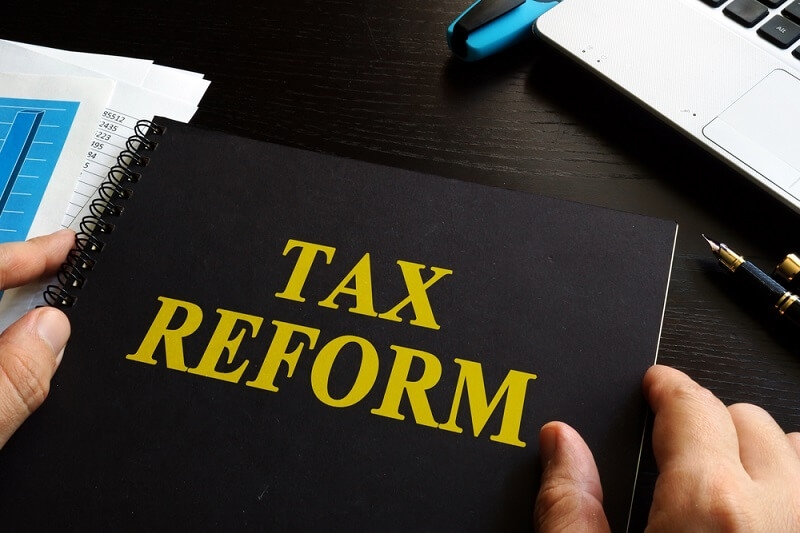
With Congress back in the boardroom discussing business tax reform, investors and market watchers are trying to dissect every proposal and amendment. The impact of business tax reform on individual careers can be pronounced, especially as discussions of cutting corporate taxes and proposals for capital gains tax reform gain intensity in 2025.
In this blog, we analyze the current tax reforms, the reasons behind them, and how they might influence investment choices, market sectors, and the general economic landscape.
As Washington lawmakers weigh a comprehensive reshaping of the corporate tax system, business tax reform is becoming a topic of debate among investors. The reform proposals revolve mostly around lowering corporate tax rates, reforming deductions, and changing the treatment of foreign income.
The main goals of this reform are:
However, with those changes come apprehension of how these changes will have a knock-on effect on financial markets, and specifically with market valuations, dividend payments, and general investor sentiments.
Of the many aspects of the reform that have become a focal point in the debate is the proposed corporate tax cuts. Lawmakers have discussed the possibility of lowering the rate of corporate income tax from 21% to a range that could be as low as 18%. More extreme suggestions have called for a flat tax of 15% aimed at multinational corporations to entice them to invest in the area, and ultimately leading to an increase in domestic investment.
However, opponents cite that past tax cuts did not cause corresponding wage increases or employment growth, but rather tended to be used for stock buybacks and executive bonuses.
Any shift in tax policy has tax reform investment implications, especially for long-term investors. Here's how portfolio performance could be impacted:
Markets like to react sharply to uncertainty surrounding policy matters. Expect volatility to increase in the major indices over the coming weeks as negotiations heat up. Portfolio reallocation or hedging could be advisable for investors with elevated equity risk.
Companies that are benefiting from tax cuts could end up raising their dividends. Utilities and consumer staples, generally preferred due to stable dividends, could gain back investor focus.
Decreased taxation might spur capital investment. This would benefit ETFs tied to infrastructure, industrial stocks, and real estate investment trusts (REITs).
If the changes to tax law include more restrictions on overseas profit repatriation, firms with worldwide interests may begin changing their business models, impacting global funds.
You can utilize the tax reform considerations to make sound investment choices within your own financial goals and risk tolerance.
The other major component of this reform package is the capital gains tax reform debate. Politicians are at odds backstage as to whether to raise the capital gains tax on wealthy investors. Right now, the long-term capital gains tax tops out at 20%, but proposals could have this going as high as 25-28% for wealthy individuals.
If you rely on the sale of appreciated assets as an income source or have a large taxable brokerage account, you will likely take a direct hit on your returns. Therefore, it will be important issues in controlling tax exposure to ramp up strategic tax-loss harvesting and long-term holding.
The business tax reform in 2025 could be the most expansive change that has occurred since the 2017 Tax Cuts and Jobs Act. Some of the main provisions include:
Making the case for multinationals to repatriate profits from foreign countries by changing rates and deductions associated with repatriation.
Regulations that would limit interest debt that is deductible by businesses, which will largely impact highly leveraged companies.
The IRS should get more money, and that could translate into more corporate audits.
A new alternative minimum tax to make sure profitable corporations pay a minimum amount, even when taking advantage of deductions and credits.
Investors need to watch how these business tax changes in 2025 play out because they have the potential to fundamentally change corporate balance sheets and earnings estimates.
Investor response to tax proposals has been varied, with varying degrees of response from different market sectors.
The imperative for investors is not so much to respond emotionally but to assess how elements in the market are set to gain or lose from certain provisions. Keeping up with investor response to tax plans assists in portfolio realignment and risk management.

Below are some practical measures you can adopt as Congress is discussing the new tax laws:
Shift more into tax-preferred accounts such as Roth IRAs or municipal bonds in order to cushion against the threat of higher taxes.
Avoid overdependency on a single sector. Diversification can help shield you from surprise tax shocks in any one sector.
Put growth-oriented investments in taxable accounts and income-generating investments in tax-deferred accounts to maximize tax results.
Utilize times of market downturn to offset gains elsewhere in your portfolio by selling poor-performing investments.
While we may not be clear on how tax legislation could be folded into future tax reform (including the repeal of the 2017 tax law), financial advisors are specifically working with clients to contemplate the business tax reform impact. Many advisors are recommending a shift to more tax-efficient investment options (e.g., index funds, municipal bonds, and tax-managed portfolios).
Financial advisors are also suggesting that clients re-evaluate their long-term goals, check their exposure to highly vulnerable sectors, and think about various tax reform situations. As we continue to lobby for capital gains, it is important that every investor utilizes a unique plan of action, as the debate continues. In the end, it is easier to take proactive, rather than reactive action, and investors will feel more confident that they are taking reasonable action regarding their investment holdings, or at least they can feel less uncertain about investing in a time of considerable business tax reform in 2025.
As the business tax reform effect unfolds, however, savvy investors will remain educated and nimble. As either an individual with a smaller portfolio or a high-net-worth investor, you need to understand the tax reform investment implications and the shifting capital gains tax reform discussion.
Being ahead of the game—by checking your asset allocation, talking to a financial advisor, and monitoring Congressional action—can position you better to ride out any tax storms and even find new opportunities.
As the year unfolds in 2025, the fate of this reform may redefine investing habits for years to come. Don't wait until the legislation passes—review your financial plan today to get ready for whatever direction Congress takes.
This content was created by AI